
Urban transportation networks are under immense pressure due to rapid city expansion. Traditional systems struggle to meet the increasing commuter demands, prompting the integration of artificial intelligence (AI) to enhance transit management and predictive maintenance. AI is transforming urban mobility into a more efficient and sustainable ecosystem through innovations in predictive maintenance and intelligent transit management.
AI-driven predictive maintenance allows transit networks to anticipate failures and reduce unexpected breakdowns significantly. Intelligent transit management optimizes routes and schedules based on real-time data, improving efficiency and reducing passenger wait times. These advancements not only enhance operational reliability but also improve the overall passenger experience, making public transport more user-friendly.
• AI reduces unexpected breakdowns by 71% through predictive maintenance.
• Intelligent transit management decreases passenger wait times by 34%.
Predictive maintenance uses real-time data to foresee and prevent system failures before they occur.
Intelligent transit management optimizes routes and schedules based on real-time passenger demand and traffic patterns.
IoT sensors monitor track conditions and vehicle health in real-time, providing critical data for AI analysis.
Isomorphic Labs, the AI drug discovery platform that was spun out of Google's DeepMind in 2021, has raised external capital for the first time. The $600
How to level up your teaching with AI. Discover how to use clones and GPTs in your classroom—personalized AI teaching is the future.
Trump's Third Term? AI already knows how this can be done. A study shows how OpenAI, Grok, DeepSeek & Google outline ways to dismantle U.S. democracy.
Sam Altman today revealed that OpenAI will release an open weight artificial intelligence model in the coming months. "We are excited to release a powerful new open-weight language model with reasoning in the coming months," Altman wrote on X.
